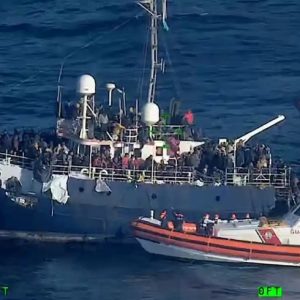The NGO rescue ship Sea Eye arrived in Reggio Calabria on Sunday. It disembarked the 144 migrants and refugees who were aboard the ship. Among the group are 20 unaccompanied minors, 2 newborn babies, and various family units.
The German NGO Sea Eye rescued the people off the coast of Libya during two separate operations. The first operation, conducted on Thursday morning, involved 84 people from Gambia, Ivory Coast, Somalia, Cameroon, Ethiopia, Guinea, Mali, Senegal, and Ghana.
The second operation, carried out on Friday afternoon, rescued 60 people from Syria, Egypt, Bangladesh, Pakistan, Sudan, and Burkina Faso.
The ship’s multiple rescue operations could lead to its impoundment. Regulations prohibiting multiple rescues by civilian vessels operating in the central Mediterranean, were introduced by Interior Minister Matteo Piantedosi at the beginning of last year.
However, Prefect Clara Vaccaro, present during the disembarkation, emphasised that addressing immediate humanitarian needs takes precedence over administrative concerns.
“The important thing is that they have landed and that we now get them sorted,” Vaccaro stated. “The rest will come in due course. Everything that needs to be done from an administrative point of view will be done,” she added.
Another rescue ship placed under administrative detention
Recently, another migrant rescue vessel, the Humanity 1, was placed under administrative detention for 20 days in the Calabrian port of Crotone.
This action stemmed from the rescue of 77 migrants and refugees from three small boats in distress, with authorities alleging that the crew failed to coordinate with the Libyan authorities, whom Italy claims were responsible for the operation.
However, SOS Humanity countered, asserting the rescue took place in international waters and was successful despite the alleged intervention of the Libyan coast guard.
This incident marks the second time the Humanity 1 has been impounded in Crotone since December, when it faced similar accusations related to obstructing the Libyan coast guard during the rescue of 200 individuals.
Migrants and refugees intercepted or rescued by the Libyan coast guard and returned to Libyan shores often endure detention and mistreatment, including torture and abuse according to humanitarian charities.





